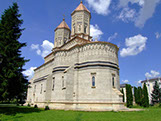







Invited Speakers
Ion Cucui
Professor Doctor, Economist
PRESENTATION: Leadership Competencies – Optimisation Vectors for Changes within School
Organisations in Pre-university Education
Studies: graduate of the Faculty of Agricultural Economics (1975) of Nicolae Bălcescu Agronomy Institute in Bucureşti. Postgraduate course on company assessment (1994) –Târgoviște. Since 1995, after dissertation entitled Strategy and Marketing Programmes in Agro-industrial Companies, he has been a doctor of economic studies. Internships of managerial training in higher education – CNAM Paris, 1998, ICHEC Brussels, 1999.
Professional Background: managing director of SAPM, Republic of Congo (1984-1986 and 1987-1989); financial manager of SAGRICOM Joint Stock Târgovişte (1986-1987 and 1990-1995); vice-rector in charge of economic issues and international relations –Valahia University in Târgovişte (1996-2002); in 2002 he becomes rector of Valahia University in Târgovişte. PhD supervisor since 2005, line of study accounting – UVT Doctoral School; visiting professor with Paris 12 University, Val de Marne – Faculty of Administration and Exchanges.
Coordinator/member of scientific and organisation committees of several national and international events: the 56th AIELF Congress in Târgovişte (2009), the Crise Financière Internationale Symposium, Ralentissement Economique Mondial et Effets sur les Economies Euro-Maghrébines, Béjaïa, Algeria (2009), Collège Doctoral Régional en Sciences de Gestion, Târgovişte (2008), Federator CEDIMES Colloquium, Târgovişte (2006), Scientific Council of Wroclaw University, Intensive Accounting Training Programme (Târgovişte - 2006, Kavala, Greece - 2005, Gőttingen, Germany - 2004, Paris, France - 2003, Porto, Portugal - 2002), Symposium on Transition Management, Târgovişte (1996, 1998, 2002, 2002, 2004), the first European CEDIMES Seminar , Târgovişte (2003), ARA Congress, Târgovişte (1997).
Scientific Background: accounting, management. Manager of over 20 national and international scientific research projects, European funded, in economics.
Publications: over 20 books as single author or multi-author, 50 papers presented in various symposiums, national and international conferences, papers published in popular magazines or annals.
Affiliations: vice-president of CEDIMES, France and manager of CEDIMES Branch in România, editor of the bi-annual journals of CEDIMES Institute in Paris, member of the Executive Office of AFECA, president of the Local ANEVAR Centre (1996-2002). Member of AIELF and AFSER. Member of the editorial board of the following journals: Annals of Valahia University in Târgovişte and Scientific Life of Valahia University. Full member of the Academy of Romanian Scientists.
Distinctions: professor of the year 2006 – line of study economic sciences, AFSER award; honorary citizen of Târgovişte Municipality and Thessaloniki Municipality.
References: http://www.aos.ro
Abstract of the talk:
Leadership Competencies – Optimisation Vectors for Changes within School Organisations in Pre-university Education
Invited Speakers
Ion STEGAROIU1*, Ion CUCUI2 and Daniela PAHOME3
1 Professor VALAHIA University Targoviste, Targoviste, 130146, Romania.
2 Professor VALAHIA University Targoviste, Targoviste, 130146, Romania.
3 PhD VALAHIA University Targoviste, Targoviste, 130146, Romania.
Abstract: Conducted from an interdisciplinary perspective, this study analyses the causality between the educational leadership dimensions and the process of change within school organisations underlain by the ontological triad: Vision – Higher-order Values – Competencies.
Based on the principle of objective causality, modelling the three components involves use of some specific concepts and theories.
From an exhaustive approach, the informational corpus of the paper comprises: the humanistic perspective and the pragmatic perspective on the leadership process, the methods to co-build the vision, the value orientations of the members of the school organisations and the cognitive determinatives of leadership.
The study includes benchmarks taken over from reference papers of UNESCO, European Commission and Eurostat and complies with the following methodological principles: close relation between comprehension and explanation of concepts, unity between use of statistical and casuistic methods and moral commitment of the researchers to formulating ascertaining judgments and evaluative judgments.
The study sample comprises 446 respondents who assumed the role of leader. They have management and executive positions within school organisations in Dâmbovița County.
Following the questionnaire, analysis is made of the impact of the following leadership competencies: assuming the position of leader within the organisation (providing some responses to the current issues of an organisation, inspiring trust, managing collective emotions and being proactive), sharing a common vision within the school organisation (the values of the leader are in close connection with the values of the organisation and the co-built vision determines every organisation member to excel oneself), reunion of the supporters around the organisational vision proposed by the leader (adaptation of the leadership style, facilitation of biunivocal relations and approach of the critical thinking), reunion of the members around the organisational vision (anticipation and definition of the organisational change dynamic, implementation of new educational practices and better quality of school life, social responsibility), influence of the leader (creating conditions for the freedom of speech and motivating each member in relation to the activity carried out within the organisation) and valorisation of the organisation members’ contributions.
The results of the study are in line with the emergent studies which demonstrate that leadership may be acquired and developed.
The reflections on the theoretical and practical aspects have outlined the following conclusions: the current society imposes high level of demands in relation to teaching staff; therefore, educational leadership represents a vital element in building the future. The development of the educational leadership process is determined by the following factors: complex organisational environments (multi-skilled teaching staff), internationalisation of the organisations (compatible rules and regulations), solving problems remotely (due to information and communication technologies), outsourcing functions (creating the organisational value based on durable partnerships, which are external to the organisational environment) and decentralisation of activities (flexible organisations which should meet the needs for change). The quality of the leadership determines the evolution or the involution of the school organisation.
Keywords: leadership, vision, values, competencies, organizational change





